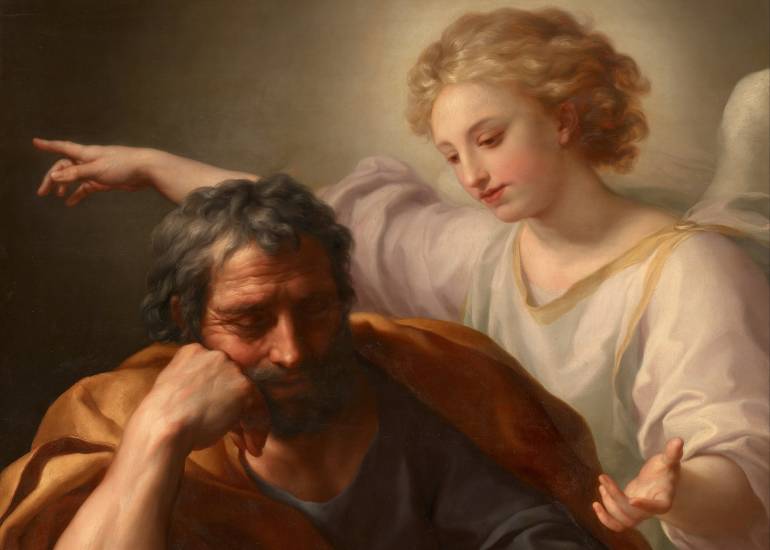St. Joseph at first Christmas reminds parents of their duty towards children

E-Sunday Word: Fourth Sunday of Advent
“...he did as the angel of the Lord had commanded him” (Matthew 1,18-24)
A. Text:
Now, this is how the birth of Jesus Christ came about. When his mother Mary was betrothed to Joseph, but before they lived together, she was found with child through the Holy Spirit. Joseph her husband, since he was a righteous man, yet unwilling to expose her to shame, decided to divorce her quietly. Such was his intention when behold, the angel of the Lord appeared to him in a dream and said, "Joseph, son of David, do not be afraid to take Mary your wife into your home. For it is through the holy Spirit that this child has been conceived in her. She will bear a son and you are to name him Jesus because he will save his people from their sins." All this took place to fulfil what the Lord had said through the prophet: "Behold, the virgin shall be with child and bear a son, and they shall name him Emmanuel," which means "God is with us." When Joseph awoke, he did as the angel of the Lord had commanded him and took his wife into his home.
B. Exegesis:
1. A retreat master told some fathers, “St. Joseph is a perfect model for you.” One father challenged him, saying, “St. Joseph’s situation is totally different from my situation. He was a saint, his wife was sinless, and his child was the Son of God. I am no saint, my wife is not sinless, and my child is not the Son of God.” The retreat master responded, “Was your wife pregnant before your marriage and you did not know by whom? Did your son leave home for three days and you did not know where he was?”
2. The beginning of the Gospel of Matthew (1,18-25), which we read on the Fourth Sunday of Advent, presents St. Joseph as a perfect model. He is “a righteous man” – a devout observer of the Mosaic Law. Infidelity following betrothal is considered adultery. Hence, he wishes to break his union with someone whom he suspects of gross violation of the Law: “… decided to divorce her quietly.”
3. St. Joseph is also merciful. He knows well that the penalty for proven adultery is death by stoning: “If within the city a man comes upon a maiden who is betrothed (that is a girl, who is married but not yet brought to her husband’s home and whose marriage is therefore still unconsummated) and has relations with her, you shall bring them both out of the gate of the city and there stone them to death …” (Deuteronomy 22,23-24). Hence he is not willing to expose her to shame.
4. St. Joseph is depicted as the son of Joseph the patriarch. Joseph of the Old Testament saw several dreams: “Once Joseph had a dream, which he told to his brothers: “Listen to this dream I had. There we were, binding sheaves in the field when suddenly my sheaf rose to an upright position, and your sheaves formed a ring around my sheaf and bowed down to it … Then he had another dream, and this one, too, he told to his brothers. “I had another dream,” he said; “this time, the sun and the moon and eleven stars were bowing down to me …” (Genesis 37,5-11); “They said to one another: “Here comes that master dreamer!” (Genesis 37,19).
Similarly, Joseph of the New Testament sees dreams:
i. “… the angel of the Lord appeared to him in a dream …” (1,20);
ii. “When they had departed, behold, the angel of the Lord appeared to Joseph in a dream and said, “Rise, take the child and his mother, flee to Egypt …” (2,13);
iii. “When Herod had died, behold, the angel of the Lord appeared in a dream to Joseph in Egypt and said, “Rise, take the child and his mother and go to the land of Israel …” (2,19-20);
iv. “… And because he had been warned in a dream, he departed for the region of Galilee” (2,22).
5. In his dreams, St. Joseph sees “the angel of the Lord” – the Old Testament designation of God in communication with human beings. He thus receives God’s Word and executes it, being “a righteous man.” He lets his former decision to divorce Mary be overcome by the heavenly command that he take her into his home and accept the child as his own.
6. By following his dreams, St. Joseph makes the salvation history flow forward. He lets the ancient prophecies be fulfilled. He adopts Jesus. Hence Jesus belongs to the family of David; the promises to David (2 Samuel 7,12-16) are fulfilled; the prophecy of Isaiah 7,14, “… the virgin shall be with child and bear a son and shall name him Immanuel” is fulfilled as well.
Joseph flees with his family to Egypt, the traditional place of refuge for those fleeing from danger in Palestine. (1 Kings 11,40: “When Solomon tried to have Jeroboam killed for his rebellion, he escaped to King Shishak, in Egypt, where he remained until Solomon's death”; Jeremiah 26,21: “When King Jehoiakim and all his officers and princes were informed of his words, the king sought to kill him. But Uriah heard of it and fled in fear to Egypt”). This event led Jesus to relive the Exodus experience of Israel.
C. Application:
7. This Gospel on the Fourth Sunday of Advent, whilst extolling the role of St. Joseph at first Christmas, reminds us of our duties as parents towards children. We ought, undoubtedly, to bring them up in a Christian way.
What is this Christian way? Let us cite some examples. We may attend the Sunday Mass regularly while our children stay either in bed or on a playground. They receive the sacred Sacraments of Baptism, Confession, Holy Communion and Confirmation. But do we not find them afterwards missing in church life? Is their Christianity extinguished till the Holy Matrimony? Does God not have a plan for these children?
We are, therefore, strengthened by the heroic example of St. Joseph to facilitate God’s Will towards our little ones.
##
Radio Veritas Asia (RVA), a media platform of the Catholic Church, aims to share Christ. RVA started in 1969 as a continental Catholic radio station to serve Asian countries in their respective local language, thus earning the tag “the Voice of Asian Christianity.” Responding to the emerging context, RVA embraced media platforms to connect with the global Asian audience via its 21 language websites and various social media platforms.













